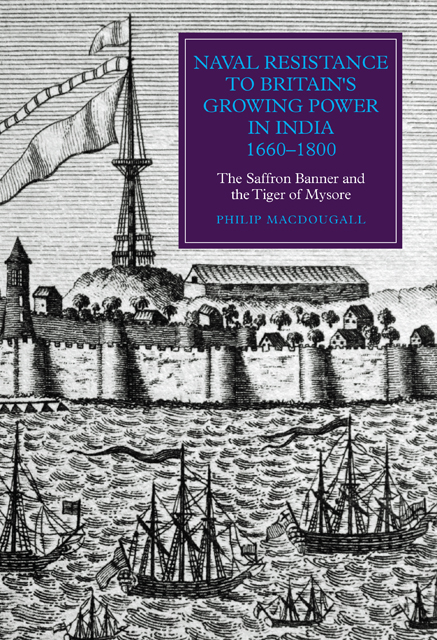 Naval Resistance to Britain's Growing Power in India, 1660–1800
Naval Resistance to Britain's Growing Power in India, 1660–1800 Book contents
- Frontmatter
- Contents
- List of Illustrations
- Abbreviations
- Chronology
- Maps
- Preface
- Part I Early Naval Resistance: The Historical Background
- Part II The Saffron Banner: Irregular Naval Warfare against an Emergent Britain
- Part III The Tiger of Mysore: A Conventional Navy to Oppose British Dominance
- Conclusion
- Bibliography
- Index
- Worlds of The East India Company
Preface
Published online by Cambridge University Press: 23 February 2023
- Frontmatter
- Contents
- List of Illustrations
- Abbreviations
- Chronology
- Maps
- Preface
- Part I Early Naval Resistance: The Historical Background
- Part II The Saffron Banner: Irregular Naval Warfare against an Emergent Britain
- Part III The Tiger of Mysore: A Conventional Navy to Oppose British Dominance
- Conclusion
- Bibliography
- Index
- Worlds of The East India Company
Summary
This book represents the first published account to describe and analyse how the British and other European powers were opposed at sea by the indigenous navies of India during the initial period of European settlement and colonialisation. Although attention is mainly centred on the period 1660 to 1800 CE (and encapsulated as such in the title of this book) it has been necessary for the purpose of providing essential context to step back in time to the arrival of Vasco da Gama in the late fifteenth century. From this a clearer understanding of the maritime strategies as developed by the indigenous states in opposition to the Europeans and the reasons for their failure is possible. While much attention has been given by historians to clashes on land between the European colonisers and the Indian rulers they encountered, few have given thought to the naval forces of the indigenous states and the maritime wars in which they participated. Instead historians, particularly those based outside of Asia, have chosen to concentrate, when looking at the vastness of the Indian Ocean, upon its use by merchant ships intent on bringing wealth out of Asia, or as a theatre of conflict for the maritime forces of the West when engaged in their wider global wars originating in Europe.
In opposing the European powers at sea, the indigenous states of India adopted four distinct strategies that were implemented over a period of three hundred years. The first, and only ever used against the Portuguese during the final years of the fifteenth century and the first few decades of the sixteenth century, was that of a head-on fleet engagement within close proximity to the western coastal belt of mainland India. It was a strategy that failed due to the Portuguese possessing vessels that were both more robust and technologically superior to the light war crafts of the Indian naval states. From this developed a second strategy, that of irregular naval warfare in which the ships of the indigenous naval powers attacked unescorted and isolated merchant ships of the European powers. Again, this was an action restricted to coastal waters, so allowing the attacking squadron of ships to quickly enter a nearby safe haven should a more powerful European vessel appear on the horizon.
- Type
- Chapter
- Information
- Naval Resistance to Britain's Growing Power in India, 1660–1800The Saffron Banner and the Tiger of Mysore, pp. xiii - xviPublisher: Boydell & BrewerPrint publication year: 2014


